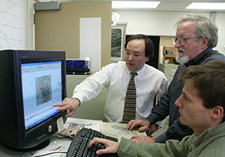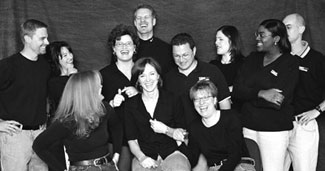|
Tech tops at USDA
 In the land of gustatory abundance that is the U.S., not many of us give thought to issues concerning food safety. But Virginia Tech is doing its part to guard our nation's food supply. In addition to Tech's national ranking in an industry magazine as a top food science and technology department, recent appointments in the upper echelons of the USDA and FDA further prove Tech's reputation for excellence in food safety issues. The USDA has added to its staff both Elsa Murano (M.S. food science and technology '87; Ph.D. '90) and Merle Pierson, former Tech professor of food science and technology. Murano succeeds Catherine Woteki (human nutrition and foods '71; M.S. '72; Ph.D. '75) as the top food safety official in the USDA: the undersecretary for food safety. In the land of gustatory abundance that is the U.S., not many of us give thought to issues concerning food safety. But Virginia Tech is doing its part to guard our nation's food supply. In addition to Tech's national ranking in an industry magazine as a top food science and technology department, recent appointments in the upper echelons of the USDA and FDA further prove Tech's reputation for excellence in food safety issues. The USDA has added to its staff both Elsa Murano (M.S. food science and technology '87; Ph.D. '90) and Merle Pierson, former Tech professor of food science and technology. Murano succeeds Catherine Woteki (human nutrition and foods '71; M.S. '72; Ph.D. '75) as the top food safety official in the USDA: the undersecretary for food safety.
"Although our food supply in the United States is considered to be the safest, most economical, nutritious, and abundant in the world," says Murano, "there are still significant issues to be addressed. The vast marketing system, both domestic and international, provides food safety challenges that transcend borders."
The most pressing of these challenges, Murano says, is the control of contaminants in raw products. Pierson, Murano's deputy undersecretary, her former mentor, and the second-ranking official concerned with food safety, should be able to help with this problem. He brings an internationally recognized expert's knowledge of Hazard Analysis of Critical Control Points, a system of maintaining food safety by protecting against contaminants due to improper cooking methods.
The former director of the Virginia Tech Center for Food and Nutrition, Lester Crawford, was appointed deputy commissioner of the FDA. Another Tech alumnus, Joseph Newbill (dairy science '71), received a presidential appointment from the Bush administration and the USDA Secretary of Agriculture as the Virginia state director of USDA-Rural Development.
Protecting the nation's resources
 Doug Domenech (forestry and wildlife management '78), the new White House liaison for the Department of the Interior, credits Tech with teaching him to work with others and focus on practical and achievable goals. From what he says about the hectic pace at the Department of the Interior, he will need those lessons. Doug Domenech (forestry and wildlife management '78), the new White House liaison for the Department of the Interior, credits Tech with teaching him to work with others and focus on practical and achievable goals. From what he says about the hectic pace at the Department of the Interior, he will need those lessons.
"Since joining the Bush Administration last July, each day it seems that we are dealing with some new crisis or challenge," says Domenech. "Whether it is an organizational issue, a homeland security issue, or wildlife or environmental restoration, each issue has its own set of challenges and opportunities. Instead of adjusting to a new routine, it is more a case of adjusting to constant change."
Balancing the department's dual missions of protecting and utilizing natural resources keeps Domenech on his toes, yet he believes those goals aren't contradictory. "Compromise is inherent in the development of any public policy," he says. "The key is assuring that all sides are heard and considered."
Domenech is accustomed to ensuring all sides get their fair say: for five years, he was the executive director of the National Center for Home Education, the lobbying arm of the Home School Legal Defense Association, where he "worked daily with members of Congress in protecting the freedom of home-school families across the country." Seeking to protect the right of children to home school led Domenech rather naturally into a role in protecting the nation's resources in a larger sense.
Domenech says he feels honored to be protecting and contributing to our country's natural heritage. "I wanted to serve this President in any capacity and asked that I be assigned to Secretary Norton's staff," he says. "I admire her philosophy of the wise use of natural resources."
Alumnus wins international design competition
 Mutual cultural admiration almost lost David Hill (landscape architecture '84), owner of Hill Studio in Roanoke, Va., an international competition to redesign a small section of Zhangjia Gang, a city 200 miles northwest of Shanghai on the Yangtze River. Hill says that some of the jurors were disappointed in the original direction of the plan. "In the West, we revere the 10,000 years of evolution in Chinese design, so we tried to site our buildings utilizing the ancient ways," he says. "But in the East, the opulence of American suburban modernism is fashionable." Mutual cultural admiration almost lost David Hill (landscape architecture '84), owner of Hill Studio in Roanoke, Va., an international competition to redesign a small section of Zhangjia Gang, a city 200 miles northwest of Shanghai on the Yangtze River. Hill says that some of the jurors were disappointed in the original direction of the plan. "In the West, we revere the 10,000 years of evolution in Chinese design, so we tried to site our buildings utilizing the ancient ways," he says. "But in the East, the opulence of American suburban modernism is fashionable."
Hill's team overcame another hurdle: "Our team was the least-known of all the competition entrants," Hill says. However, the team's "design showed a level of solution-originality and inspiration that impressed the jury." Hill specifies what gave his team's design the edge: "the 'coolest' aspect of the entry is the way that it incorporated a holistic approach to a health-oriented resort. A system of features reinforces healthy living, making reference to millennia of lessons learned along the Yangtze River."
Major contributors to the project were Benyi Liu, a landscape architecture professor at Tongji University in Shanghai and a former visiting professor at Virginia Tech, who originally recommended Hill to the Chinese authorities; Ben Johnson, a landscape architecture professor and the project's senior designer; and Catherine Xu, one of Johnson's graduate assistants. "She is the unsung heroine of this work," says Hill. "The only bilingual member of the U.S. side, Catherine is the glue that held the two-continent team together."
The heavy involvement of Virginia Tech faculty, staff, and students in the project, and in other Hill Studio projects, lends support to Hill's claim that Hill Studio can have a real impact on Tech's push to become a top-30 research institution. "Hill Studio's proximity to Blacksburg and our relationship with the university have enabled several private-public ventures over the last 15 years. It is our hope that we can continue our progress, immersing students in some of the most important design issues of our time."
One lesson that could be learned, says Hill, has to do with the competition system in place in China, where firms invited to compete for a commission are given a stipend for the conceptual planning work, which is then reviewed by a jury of professionals. "The advantage of this system is that the owner gets the brainpower of several professional schemes and the wisdom of the best reviewers; ultimately, a project's success has a greater chance."
The key to her success
At a posh sales-award dinner in New York, Katrina VanHuss (communications, biology '86), the only female sales representative in attendance, found herself sitting next to the CEO of her company. "In my infinite 25-year-old wisdom," she reports, "I said to him, 'I don't believe in the glass ceiling. I believe I will work hard and smart and I will be promoted.' He looked at me and said, 'You're wrong. I wish it were that way.'"
 To VanHuss, the answer to the unexpected reality check was simple: start her own company. Turnkey Promotions, the product of that inspiration, was placed on the "Rising 25" list of Richmond's fastest-growing businesses for 2002. Her outlook on the business world is also simple. When asked why her answers to management questions sound like those a parent would give, she says, "People, including myself, don't change too terribly much from how they are when they're 7 years old. The same stuff still works: time out, ostracization in the adult world; consequences for actions, action plan in the adult world; getting in trouble for calling names, harassment suit in the adult world; etc." To VanHuss, the answer to the unexpected reality check was simple: start her own company. Turnkey Promotions, the product of that inspiration, was placed on the "Rising 25" list of Richmond's fastest-growing businesses for 2002. Her outlook on the business world is also simple. When asked why her answers to management questions sound like those a parent would give, she says, "People, including myself, don't change too terribly much from how they are when they're 7 years old. The same stuff still works: time out, ostracization in the adult world; consequences for actions, action plan in the adult world; getting in trouble for calling names, harassment suit in the adult world; etc."
She is quick to draw other parallels between childhood and the business world. "When I work with Anna, my daughter with Down's Syndrome, I don't look at 10 years from now. I look at today, right now. I teach her what a 'A' looks like, not how to read National Geographic. I'm going to get excited about learning 'A.' Then, we'll learn 'B.' And one day we'll look at more than the pictures in National Geographic. That's how I do business."
The secret to her success? "When I face challenges, I ask for help--all the time. And, I don't fear looking stupid. In fact, I'm pretty used to looking stupid," says the successful businesswoman and mother of three.
|

